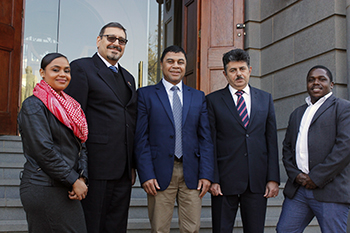Latest News Archive
Please select Category, Year, and then Month to display items
12 January 2024
|
Story Nonsindiswe Qwabe
|
Photo Sonia Small
 Since joining the UFS in 2008, Dr Grey Magaiza has worked extensively on approaches that can foster the socio-economic transformation of societies.
Since joining the UFS in 2008, Dr Grey Magaiza has worked extensively on approaches that can foster the socio-economic transformation of societies.
“The future should be one where communities can decide on their development agenda and futures. That’s the most important for me.” Dr Grey Magaiza, Deputy Director of the Centre for Gender and Africa Studies (CGAS) and Head of the Community Development programme on the Qwaqwa Campus, is passionate about capacitating communities to be agents of change and advancement. His vision for the future emphasises the empowerment of communities to take charge of their development by actively participating in decision making and the implementation of development projects that can improve their lives.
Since joining the UFS in 2008, Dr Magaiza has worked extensively on approaches that can foster the socio-economic transformation of societies. Over the years, he has crafted his research speciality into one that he is most proud of – being an interdisciplinary scientist immersed in the development of communities.
“I’m in a fortunate position of researching what I like. I say ‘fortunate’, because I’ve taken the time to understand what I’m passionate about, which is the overall field of rural livelihoods and livelihood futures – in short, community development. My research starts from an engaged university, understanding the elements that a university must use to enhance transformation and relevance to its immediate community in terms of development.”
One of the ways he has done this is by looking at social entrepreneurship as a development approach for young people in a rural setting. Through workshops with non-profit and civic organisations in Qwaqwa, Dr Magaiza has been helping these organisations to map out their needs and actively meet them through the involvement and support of external role players.
“We understand that communities are part of the national development agenda, but even that national agenda respects community knowledge and intentions and allows communities to shape their identity. A critical enabler of this is community organising. You bring back the capacity in communities to have dialogues on issues affecting them as spaces for engagement, knowledge exchange, and for people to just talk about their way forward.”
By enabling communities to define their development agenda, they can address their specific needs, challenges, and aspirations, he said. “When I look at livelihood futures, it’s quite an exciting aspect of my work – it’s like looking into a fortune tellers’ globe, because you’re not deciding for communities what they should do, but the communities themselves take those decisions.”
Palestinian Ambassador discusses future collaboration in education and development with UFS
2017-06-08

From the left: Chevon Jacobs (Office of International Affairs),
Ambassador Hashem Dajani, Prof Francis Petersen,
Chargé d’Affaires Bassam Elhussiny, and
Kanego Mokgosi (Office of International Affairs).
Photo: Eugene Seegers
Palestine’s Ambassador to South Africa, His Excellency Hashem Dajani, paid a courtesy call to Prof Francis Petersen on 30 May 2017 at the Bloemfontein Campus. Ambassador Dajani was accompanied by Chargé d’Affaires Bassam Elhussiny to congratulate Prof Petersen on his appointment as Vice-Chancellor and Rector of the University of the Free State (UFS).
The diplomatic visit entailed discussions of possible collaborative initiatives between the UFS and universities in Palestine in areas such as student exchanges, capacity building and development, and research.
Diplomacy in action - a tool for internationalisation
The UFS has in the past hosted the Palestinian delegation on public engagements held with the university community, including students and the Institute of Reconciliation and Social Justice, to showcase the socio-political situation in Palestine through the use of film and panel discussions.
The UFS has built strong networks with other foreign diplomatic missions in the country which have yielded interaction between diplomats and institutes, students and academics on the Bloemfontein Campus. These collaborations are an important tool for success of the broader university’s strategy of internationalisation.
It is through the visit of Ambassador Dajani that the university and the Office of International Affairs hopes to create firm, future strategic collaborations with Palestinian universities, academics and students.